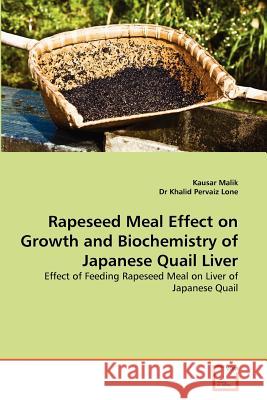Rapeseed Meal Effect on Growth and Biochemistry of Japanese Quail Liver » książka
Rapeseed Meal Effect on Growth and Biochemistry of Japanese Quail Liver
ISBN-13: 9783639240269 / Angielski / Miękka / 2011 / 60 str.
A detailed study was undertaken in order to determine the safe dose of mustard seed meal in the diet for Japanese quails which can be used at the production level without having deleterious effects on the growth of this bird. For this purpose, some 1500 birds were fed different levels of mustard seed meal in isocaloric and isonitrogenous diets. The results of feeding of these diets for 30 days show that there are no toxic effects on the growth of birds. In fact the birds on the experimental rations were either comparable or heavier than the control except 5% group. Different biochemical and physiological studies were performed on the liver show that glucosinolates present in the mustard did not have the drastic effects which have been reported in the literature for mammals and other domestic birds. The changes reported herein were seemed to have more of the manifestation of the age rather than the effect of glucosinolates.
A detailed study was undertaken in order to determine the safe dose of mustard seed meal in the diet for Japanese quails which can be used at the production level without having deleterious effects on the growth of this bird. For this purpose, some 1500 birds were fed different levels of mustard seed meal in isocaloric and isonitrogenous diets. The results of feeding of these diets for 30 days show that there are no toxic effects on the growth of birds. In fact the birds on the experimental rations were either comparable or heavier than the control except 5% group. Different biochemical and physiological studies were performed on the liver show that glucosinolates present in the mustard did not have the drastic effects which have been reported in the literature for mammals and other domestic birds. The changes reported herein were seemed to have more of the manifestation of the age rather than the effect of glucosinolates.











